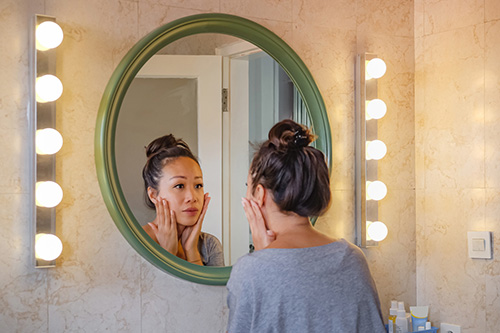What causes unwanted hair growth
Excess or unwanted hair growth can be an irritating or downright embarrassing problem for women. But cosmetic concerns aside, excessive hair growth may be an underlying sign of a hormonal imbalance that needs to be taken seriously.

If you’ve experienced a change in your hair growth, such as thicker, darker or more widespread hair, it’s a good idea to take a look at what might be causing your hair growth. And particularly in women over 35, a key culprit may be sex hormone imbalance.
Is facial hair a sign of too much testosterone?
The simplest and most common explanation for excessive hair growth is hormone changes related to perimenopause or menopause. If you’re over 35 and experiencing changes to your hair growth, that’s the most likely reason why. Women undergoing menopause are particularly prone to increased hair growth on the face, chin, chest, nipples, or genital regions.
Many women believe that the “male” hormone testosterone causes their own excess hair growth because of where it shows up. While women produce small amounts of testosterone, too, the real cause of excess hair growth in women is more complicated than testosterone production alone.
Is facial hair a sign of too much testosterone?
The simplest and most common explanation for excessive hair growth is hormone changes related to perimenopause or menopause. If you’re over 35 and experiencing changes to your hair growth, that’s the most likely reason why. Women undergoing menopause are particularly prone to increased hair growth on the face, chin, chest, nipples, or genital regions.
Many women believe that the “male” hormone testosterone causes their own excess hair growth because of where it shows up. While women produce small amounts of testosterone, too, the real cause of excess hair growth in women is more complicated than testosterone production alone.
Hormone balance and hair growth
Perimenopausal hormone changes affect not only how much testosterone is present in the body, but also the relative levels of testosterone compared with other “female” hormones like estrogen and progesterone. This matters for hair in some women because, depending on your genetics, your hair follicles may have high sensitivity to testosterone, which promotes hair growth.
In addition, when estrogen levels outpace progesterone, it can also promote hair growth. So a good place to start is to support your body in naturally balancing its hormones during perimenopause and menopause.
But it’s important to realize that there may be another hormone imbalance underlying some of these shifts: insulin resistance.
Insulin resistance, PCOS, and excess hair
If you become insulin resistant, your body loses its ability to respond to glucose and properly metabolize food. As one of your body’s “major” hormones, insulin is involved in just about everything your body does. It’s responsible for the metabolism of glucose — the body’s main fuel.
A lot of complicated factors contribute to insulin resistance, but some that we know about include eating a diet that’s high in sugar and refined carbohydrates, imbalanced gut flora, and lack of exercise. Unchecked, it can eventually lead to type 2 diabetes, which is a serious health issue.
Insulin resistance is sometimes the reason your body has trouble balancing its “minor” hormones, including estrogen, progesterone, and testosterone. However, insulin resistance and excess hair are both associated with polycystic ovarian syndrome (PCOS). For women with insulin resistance, menstrual irregularities, and heavy hair growth, it’s worth exploring whether PCOS is involved. Women with PCOS commonly have elevated levels of insulin and testosterone — so it’s no wonder that one of the common symptoms of PCOS is excess facial hair.
What to do about excess hair
Many women spend countless hours plucking, tweezing, and waxing face and body hair, but these are temporary (and painful!) solutions. If unwanted hair is a sign of an underlying hormonal imbalance that needs to be addressed, it makes sense to approach it at the source by balancing your hormones.
Whether it’s simply the expected hormonal shifts of perimenopause or more serious conditions like insulin resistance and PCOS, the underlying hormone imbalance usually responds well to a natural approach that includes a balanced diet — one that emphasizes fresh, whole fruits, vegetables, and grains and fewer processed, high-carbohydrate foods — with further endocrine support from medical-grade nutritional supplements, probiotics, and gentle exercise.
We’ve had great success in helping women restore hormonal balance with our natural approach. For women whose excess or unwanted hair growth is hormonal, our approach can help reduce or eliminate excess hair, without the pain and discomfort of hair removal treatments.










